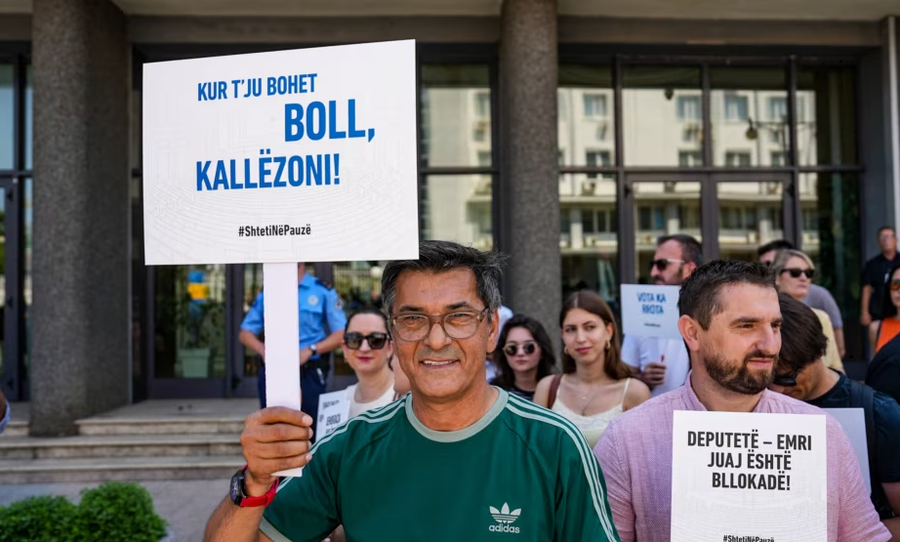
Is there anything more predictable at the moment than the sessions for the constitution of the Assembly of Kosovo? Nothing changes in those 2-3 minutes of the session, except the clothes of the deputies. A saying, often attributed to the physicist Albert Einstein, says that “insanity is doing the same thing over and over again, and expecting different results”. What, then, should change in the case of the Assembly, so that the state does not go downhill?
Kosovo is suffering both politically and financially from the saga of the constitution of the Assembly, following the February 9 elections. On June 26, the Constitutional Court ruled that the constitutive session should be completed within 30 days. The parties immediately came up with their interpretations regarding the secret ballot for the candidate for Speaker of Parliament. We will have time to see what will happen...
Now let's focus on the financial factor.
In the absence of ratification of international agreements with the World Bank, Kosovo is risking the loss of 230 million euros.
Some of the agreements, worth 130 million euros, have been delayed since 2024, while others, worth 100 million euros, are new deals.
And, for Kosovo, one of the poorest countries in Europe, every euro is valuable.
Blendi Hasaj, executive director at the GAP Institute for Advanced Research, tells Radio Free Europe (RFE/RL) that some of these funds have been allocated to Kosovo in the form of grants - that is, without return.
"These agreements are related to support for the green transition, increasing competitiveness, as well as reactivating the health information system, projects related to early childhood education."
International agreements are ratified in Kosovo with a two-thirds majority of the votes of the deputies.
Another very important draft law concerns the funds that Kosovo can benefit from, through what is known as the European Union (EU) Growth Plan.
From the 6 billion euro fund for the Western Balkan countries, Kosovo has received around 900 million - part in the form of a grant, and part in the form of a loan.
If analyzed per capita, Kosovo is the largest beneficiary of these funds.
In contrast, several neighboring countries have already received 7 percent of the funds as pre-financing, which means that Kosovo could easily receive around 61 million euros.
When is the deadline for approval?
The acting Minister of Finance, Hekuran Murati, has sounded the alarm over at least 90 million euros allocated by the World Bank, with zero percent interest.
He said that if the agreement is not ratified by September, "there is a very high risk that these funds will be taken from Kosovo and given to another state."
Other funds may also have this fate. Hasaj believes that there is pressure even within the World Bank itself.
"World Bank managers should be under pressure to start implementing them [projects] as soon as possible. Let's not forget that some of these loans being allocated to Kosovo are at very attractive rates, and I believe that the demand for such loans is also high from other countries."
Augustin Palokaj, a journalist who follows EU policies, tells REL that, although some politicians have stated that there is time to receive EU funds, they are in fact money that is time-limited for the period 2024-2027.
"If this political impasse continues, if Kosovo continues to have no government until spring of next year, with the possibility of ratifying international agreements, then we could be approaching the deadline when a very large portion of this money could be lost."
In addition, he recalls that Kosovo continues to be under EU punitive measures, and thus does not have access to financial assistance from pre-accession funds (IPA).
"There are EU member states that say that it would not make sense to lift the measures as long as Kosovo does not have institutions with which the EU would work, as there are several conditions that must be met."
The government lacked legitimacy to make important decisions
The political crisis is also being reflected in delays in Kosovo's integration into international structures, as the current government in office lacks the legitimacy to make important strategic decisions on behalf of Kosovo.
According to Palokaj, the political problem was confirmed during the visit of the EU's chief diplomat, Kaja Kallas, to Pristina a few weeks ago.
"She met with leaders of Kosovo institutions, mostly in the capacity of representatives of political parties, as they are aware that in the existing circumstances they cannot be given full legitimacy."
In this situation, the dialogue process with Serbia may remain on hold, as may the goal of membership in the Council of Europe, since in the absence of competent institutions, there is no will to submit the draft for the formation of the Association of Serb-majority Municipalities to the Constitutional Court for review - as a condition for membership.
"A Kosovo government, which was very stable back then [in 2024], has not done this, so it is unimaginable that an outgoing government would do this now," says Palokaj.
Meanwhile, civil society opposes the blockade created by political parties, and in one of the latest actions, its members asked with banners in their hands: "Until when?".
Apparently, no one has an answer... (A2 Televizion)











